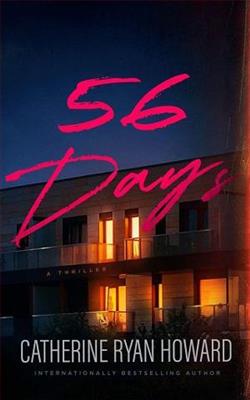Summary

56 Days
by Catherine Ryan Howard
No one even knew they were together. Now one of them is dead.
Fifty-six days ago
Ciara and Oliver meet in a supermarket queue in Dublin and start dating the same week COVID-19 reaches Irish shores.
Thirty-five days ago
When lockdown threatens to keep them apart, Oliver suggests they move in together. Ciara sees a unique opportunity for a relationship to flourish without the scrutiny of family and friends. Oliver sees a chance to hide who - and what - he really is.
Today
Detectives arrive at Oliver’s apartment to discover a decomposing body inside.
Can they determine what really happened, or has lockdown created an opportunity for someone to commit the perfect crime?
.
Read
56 Days on http://kissnovel.net
Martial Peak Reviews
Catherine Ryan Howard's 56 Days is a gripping psychological thriller that masterfully intertwines the themes of isolation, deception, and the complexities of modern relationships against the backdrop of the COVID-19 pandemic. This novel not only captivates with its suspenseful plot but also offers a profound commentary on how extraordinary circumstances can bring out the best and worst in people.
The story begins with the seemingly innocent meeting of Ciara and Oliver in a Dublin supermarket queue, a chance encounter that quickly evolves into a whirlwind romance. The timing, however, is anything but ordinary; the world is on the brink of a pandemic, and soon, lockdown measures will change everything. Howard skillfully uses this setting to explore the dynamics of a relationship that is both accelerated and shrouded in secrecy. The reader is immediately drawn into the tension of their relationship, knowing that something sinister lurks beneath the surface.
As the narrative unfolds, Howard employs a dual timeline structure that alternates between the present day, where detectives discover a decomposing body in Oliver's apartment, and flashbacks that reveal the couple's relationship over the past fifty-six days. This technique not only builds suspense but also allows readers to piece together the puzzle of what led to the tragic outcome. The juxtaposition of the initial excitement of a new romance with the grim reality of a crime scene creates a palpable tension that keeps readers on the edge of their seats.
Character development is one of the novel's strongest aspects. Ciara is portrayed as a relatable yet complex character, navigating the challenges of a new relationship during a time of uncertainty. Her desire for connection and intimacy is palpable, and Howard does an excellent job of illustrating how the lockdown serves as both a catalyst for their relationship and a veil for Oliver's true nature. Oliver, on the other hand, is a more enigmatic figure. As the story progresses, layers of his character are peeled back, revealing a man who is not only charming but also deeply flawed. The contrast between Ciara's vulnerability and Oliver's hidden darkness creates a compelling dynamic that drives the narrative forward.
One of the most intriguing themes in 56 Days is the concept of isolation and its effects on human behavior. The lockdown serves as a microcosm for the characters' emotional states, amplifying their fears, desires, and ultimately, their capacity for deception. Howard deftly illustrates how the pandemic has forced individuals into close quarters, stripping away the social facades that often mask true intentions. This theme resonates deeply in today's world, where many have experienced the strain of isolation and the complexities of relationships during such unprecedented times.
Moreover, the novel raises questions about trust and the nature of love. Can one truly know another person in such a short time, especially when external circumstances create a pressure cooker environment? Ciara's journey is a poignant exploration of this question, as she grapples with her feelings for Oliver while uncovering unsettling truths about him. The psychological tension is expertly crafted, leading to a climax that is both shocking and thought-provoking.
Howard's writing style is sharp and engaging, with a keen eye for detail that brings the setting and characters to life. The dialogue is crisp and realistic, capturing the nuances of modern relationships and the impact of societal pressures. The pacing is well-executed, with each chapter ending on a note that compels the reader to continue, making it difficult to put the book down.
In comparison to other psychological thrillers, 56 Days stands out for its unique premise and timely relevance. It echoes the works of authors like Gillian Flynn and Paula Hawkins, who also delve into the darker aspects of human relationships. However, Howard's novel distinguishes itself by grounding its narrative in the very real and contemporary context of a global pandemic, making it a reflection of our times. The exploration of how external crises can exacerbate personal conflicts adds a layer of depth that is often missing in traditional thrillers.
Overall, 56 Days is a compelling read that not only entertains but also provokes thought about the nature of love, trust, and the human condition in times of crisis. Catherine Ryan Howard has crafted a narrative that is both timely and timeless, resonating with readers who have navigated their own relationships during the pandemic. The book's exploration of isolation, deception, and the quest for connection makes it a standout in the genre, ensuring that it will linger in the minds of readers long after the final page is turned.
In conclusion, 56 Days is a must-read for fans of psychological thrillers and anyone interested in the complexities of human relationships during extraordinary times. With its intricate plot, well-developed characters, and thought-provoking themes, Catherine Ryan Howard has delivered a novel that is as entertaining as it is insightful.
























Reviews 0
Post a Reviews: